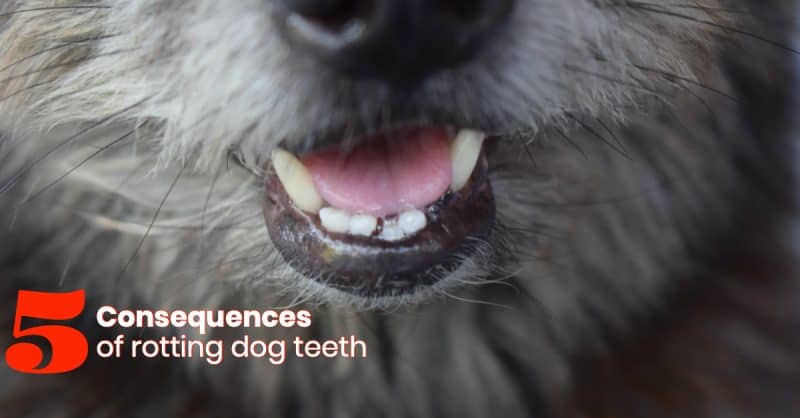Far too often, veterinarians discover during Preventive Care Exams that their canine patient has serious dental disease. Loose, discolored teeth, a foul odor to the breath and infected gums are just a few of the signs of canine periodontal disease.
Rotten dog teeth aren’t just their own issue; they can cause many other serious health problems. If your dog’s dental care hasn’t been top of mind, it should be. If left unaddressed, dental disease can cause progressive issues that put your dog’s entire body and overall health at risk. Here are some of the health problems that can result from periodontal disease:
Gum Inflammation
Beneath the gum line, the bacteria associated with plaque release toxins that damage the surrounding tissues. White blood cells then enter those areas in an effort to destroy the bacteria. This process causes significant inflammation of the gums, known as gingivitis. The inflammation causes the gums to look abnormally red and puffy, and the tissue may bleed when touched.
Tooth Loss and Jaw Fracture
Inflammation also commonly leads to periodontitis, or loss of bone and the supportive, structural tissues surrounding the teeth. When white blood cells attempt to clear accumulating bacteria, the resulting inflammatory process erodes the supporting tissues of the tooth. Over time, this destruction causes structural weakening of the tooth sockets and jaw bones. Symptoms of periodontitis include loose teeth and infection or fracture of the jaw.
Kidney and Liver Disease
Oral inflammation allows bacteria in the mouth to enter directly into the bloodstream. Once circulating, these bacteria can travel to and establish in other organs, especially the liver and kidneys. Organ infection (like liver disease or kidney disease) and failure are well-documented consequences of untreated canine periodontal disease.
Heart Disease
Chronic inflammation from periodontal disease can also increase a dog’s risk of heart disease.
Circulating bacteria can cause an inflammatory condition known as endocarditis. Studies have also shown that dogs with dental disease have an increased risk of congestive heart failure, a progressive and potentially fatal disease.
Loss of Weight and Appetite
Dental issues may cause eating to become an uncomfortable or even painful process for your dog. As a result, they may be reluctant to open their mouth and chew food properly, and may drop food from their mouth while eating.
Over time, the reluctance to eat can take a toll on your dog’s body condition, leading to weight loss.
Poor appetite and weight loss may also indicate that dental disease is causing chronic problems in the liver, heart and kidneys.
Routine Dental Care Is Essential for Prevention
The best way to maintain your dog’s oral health is to take appropriate preventative measures to protect their teeth before symptoms occur. Read our next blog article for tips on this. When performed consistently, these simple steps can help minimize the buildup of the bacterial film that leads to plaque and tartar.
If your dog is already showing signs of tooth decay, go see your veterinarian right away before it leads to even more serious issues.
